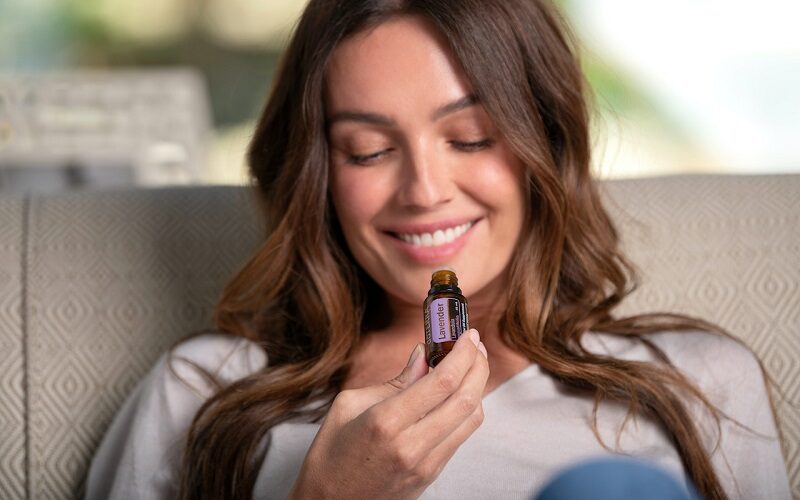In your quest to find the best essential oils for stress, it’s important to understand that your sense of smell profoundly impacts your mental and emotional well-being. Some essential oils have been found to help reduce stress and create a calming atmosphere. This intricate relationship between scent and feeling means certain aromas can create a calming effect on both body and mind.
Do Essential Oils Actually Relieve Stress?
For centuries, essential oils that relieve stress have been used to enhance mental health — but do they work? Research suggests that various scents actually can help relieve certain types of stress and anxiety, and today, it’s pretty widely accepted that essential oils can promote relaxation, lessen worry, and enhance overall health.
“Essential oils are finally getting the recognition they deserve. For thousands of years, we have known that the air we breathe affects our health and well-being. Nature has provided us with plants that, when burned or turned into an oil, or tea, can benefit our nervous system and overall well-being.”
– Talkspace therapist Dr. Karmen Smith LCSW DD
The science behind essential oils and stress relief
The science behind essential oils’ efficacy lies in their ability to produce fragrance molecules that interact with our olfactory system, triggering responses in the brain associated with emotions and memories. When natural plant extracts stimulate the olfactory system, it sends signals to the limbic system, which is involved in our emotions.
If you want to know how to lower cortisol — the hormone released during stress — one study determined that certain scents can decrease cortisol levels, helping to alleviate tension and anxiety.
Another study found that some oils contain compounds with calming effects comparable to medications prescribed for anxiety. These findings indicate that certain scents might be natural alternatives for managing stress-related symptoms.
Top Essential Oils for Stress Relief
Some of the most well-loved essential oils for stress relief include:
- Lavender: Known for calming and relaxing properties, lavender oil can help reduce anxiety and promote better sleep.
- Bergamot: This citrusy oil can reduce stress and enhance mood.
- Chamomile: This calming essential oil helps quell anxiety and promotes relaxation.
- Ylang-Ylang: The floral oil ylang-ylang can reduce stress and encourage relaxation.
- Frankincense: Frankincense oil has been used for centuries to induce relaxation and as an effective way to manage stress.
1. Lavender: the calming classic
Stressed out? Take a deep breath and reach for lavender essential oil. This popular oil has been used for centuries for relaxation and anxiety.
Lavender contains compounds like linalool and linalyl acetate that have a soothing effect on the nervous system. These compounds interact with neurotransmitters in the brain to regulate mood and emotions, helping to reduce feelings of stress.
Research even suggests that inhaling lavender essential oil can lower cortisol levels, the hormone associated with stress, resulting in an overall sense of calmness.
2. Bergamot: citrusy relief for your nerves
Derived from the peel of the bergamot orange, Bergamot essential oil is known for its uplifting and calming properties. The citrusy scent of bergamot oil helps reduce anxiety, stress, and even symptoms of depression. The unique combination of stimulating and relaxing effects makes it an ideal choice for those seeking mental balance during stressful times.
3. Sandalwood: grounding scent for tranquility
Known for its deep, woodsy fragrance, sandalwood essential oil has been utilized throughout many cultures to boost peace and intellectual sharpness. Sandalwood essential oil’s soothing qualities make it an excellent option to combat anxiety and stress.
4. Frankincense: the ancient stress solution
Olibanum, or frankincense, is a fragrant resin extracted from the Boswellia tree. It’s been used for hundreds of years in traditional medicine and religious rituals for its calming and grounding properties. Today, frankincense essential oil is recognized as a powerful tool to help alleviate stress and anxiety.
The primary active compounds in frankincense essential oil are boswellic acids, which have anti-inflammatory and analgesic effects that can contribute to overall relaxation. Additionally, research suggests that inhaling frankincense can help reduce heart rate and high blood pressure — common symptoms of stress.
5. Lemon: a refreshing way to reduce anxiety
The refreshing, zesty scent of lemon essential oil can help you feel more relaxed and tranquil while boosting your mood. Lemon oil can help alleviate stress and anxiety by promoting mental clarity and focus. The fresh, citrusy aroma is an instant mood boost that makes you feel more relaxed and positive.
Research shows that inhaling lemon may have a significant impact on reducing stress levels. In one study, participants who inhaled lemon essential oil experienced reduced anxiety scores compared to those who did not.
6. Clary sage: herbal help for relaxation
If you’re stressed, clary sage essential oil is the way to go. This natural remedy has been used for centuries to promote relaxation and mental clarity. Its earthy, slightly sweet scent is known to have a calming effect on the mind and body.
Clary sage has been shown to significantly decrease cortisol levels, the hormone responsible for stress. By reducing cortisol levels, it can help manage feelings of anxiety and tension.
7. Chamomile: soothing solution for stress
Chamomile is an herb used for centuries to promote relaxation and reduce stress. Its calming properties make it one of the best essential oils for alleviating anxiety and promoting mental well-being. Chamomile essential oil is derived from the flowers of either German or Roman chamomile plants, which have similar effects on the mind and body. Research found that inhaling chamomile essential oil can help decrease symptoms associated with generalized anxiety disorder.
8. Orange: uplifting and stress-reducing
Orange essential oil is a citrusy scent that has been used for centuries to improve mental health and reduce anxiety.
The secret to orange essential oil that relieves stress lies in its main component, limonene. According to research, limonene has anti-anxiety effects on the central nervous system, making it an excellent choice for those looking to improve their mental well-being.
9. Rose: floral serenity for the mind
The next time you’re stressed, take a whiff of rose oil. This essential oil is known for its calming and soothing properties, making it a great choice for calming anxiety and encouraging relaxation. Extracted from rose petals, this calming essential oil is commonly used in aromatherapy to improve mental well-being.
10. Jasmine: relaxation for your senses
Derived from the jasmine flower, jasmine essential oil is known for its exotic and uplifting scent. Jasmine’s calming properties have been used in aromatherapy to reduce stress, anxiety, and depression. Its sweet aroma can evoke feelings of happiness and positivity while promoting a sense of inner peace.
Some research found that jasmine oil may have anxiolytic (anti-anxiety) effects on the central nervous system by interacting with GABA receptors in the brain. This interaction helps regulate mood and increase relaxation, making it one of the most effective and natural stress management techniques.
11. Marjoram: warm comfort for the nervous system
Marjoram essential oil, a less renowned fragrant substance, has been used for years to reduce tension and uneasiness. Its warm, comforting scent is reminiscent of sweet herbs. It can provide a sense of calm when inhaled or applied topically.
The benefits of marjoram essential oil include anxiety relief.
12. Patchouli: earthy ease for anxiety
Originating from the leaves of the patchouli plant, this essential oil is known for its earthy and musky scent. Patchouli has been used in traditional medicine to help alleviate stress and anxiety due to its calming effects on the mind.
This essential oil promotes relaxation by easing tension in both body and mind. Its soothing properties effectively reduce restlessness and encourage better sleep quality.
How to Incorporate Essential Oils into Your Daily Routine
For a stress-free lifestyle that relies on natural remedies to bring peace to your days, the tips here will help you incorporate essential oils into your daily routine and use DIY stress relief blends safely and effectively.
“You can use essential oils in bath water by putting pure lavender with Epsom salt. Lavender is a calming agent, and salt pulls out toxins from the body. When getting a massage, the oils contain eucalyptus, which can cleanse and refresh the nervous system and muscles. In the next few years, there will be more plant oils hitting the market, and it will be exciting to see which remedies work for you.”
– Talkspace therapist Dr. Karmen Smith LCSW DD
Tips for using essential oils safely and effectively
Essential oils can be a powerful tool for stress relief when used safely and effectively.
- Dilute properly: Always dilute essential oils with a carrier oil (like coconut or almond oil) before applying them directly onto the skin. Use 1-2 drops of essential oil per teaspoon of carrier oil.
- Inhalation: Use an aromatherapy diffuser or simply breathe in the scent from the bottle to enjoy the benefits of essential oils through inhalation.
- Bath time relaxation: Add a few drops of your favorite stress-relieving essential oil(s) to a warm bath for an immersive, relaxing experience.
- Massage therapy: Combine diluted essential oils with massage techniques to help relieve tension and soothe anxiety.
DIY stress relief blends with essential oils
Create your custom blend by combining two or more stress-relieving essential oils. Here are some ideas to get you started:
- Rose & Lavender: Mix equal parts rose and lavender for a calming floral blend that promotes relaxation and emotional balance.
- Jasmine & Ylang-Ylang: This exotic oil blend helps reduce anxiety while promoting happiness and well-being.
- Marjoram & Bergamot: A comforting blend that eases nervous tension and promotes a sense of calm.
- Patchouli & Frankincense: This earthy mix helps ground your emotions, alleviating anxiety and promoting relaxation.
Seek Professional Stress Advice with Talkspace
If you’re struggling with stress or other mental health concerns, seek professional help through an online therapy platform like Talkspace. Licensed therapists can provide personalized guidance on coping strategies, including using essential oils for stress relief. Stress therapy through the use of essential oils and a professional therapist’s guidance can give you the resources to combat stress and boost your well-being.
Sources:
- Koulivand PH, Khaleghi Ghadiri M, Gorji A. Lavender and the nervous system. Evidence-Based Complementary and Alternative Medicine. 2013;2013:1-10. doi:10.1155/2013/681304. https://www.ncbi.nlm.nih.gov/pmc/articles/PMC3612440/. Accessed June 6, 2023.
- Hongratanaworakit T. Aroma-therapeutic effects of massage blended essential oils on humans. Nat Prod Commun. 2011;6(8):1199-1204.https://pubmed.ncbi.nlm.nih.gov/21922934/. Accessed June 6, 2023.
- Koulivand PH, Khaleghi Ghadiri M, Gorji A. Lavender and the nervous system. Evidence-Based Complementary and Alternative Medicine. 2013;2013:1-10. doi:10.1155/2013/681304. https://www.ncbi.nlm.nih.gov/pmc/articles/PMC3612440/. Accessed June 6, 2023.
- Han X, Gibson J, Eggett DL, Parker TL. Bergamot (citrus bergamia) essential oil inhalation improves positive feelings in the waiting room of a Mental Health Treatment Center: A pilot study. Phytotherapy Research. 2017;31(5):812-816. doi:10.1002/ptr.5806. https://www.ncbi.nlm.nih.gov/pmc/articles/PMC5434918/. Accessed June 6, 2023.
- CHEN Y, ZHOU C, GE Z, et al. Composition and potential anticancer activities of essential oils obtained from myrrh and frankincense. Oncology Letters. 2013;6(4):1140-1146. doi:10.3892/ol.2013.1520. https://www.ncbi.nlm.nih.gov/pmc/articles/PMC3796379/. Accessed June 6, 2023.
- Orchard A, van Vuuren S. Commercial essential oils as potential antimicrobials to treat skin diseases. Evidence-Based Complementary and Alternative Medicine. 2017;2017:1-92. doi:10.1155/2017/4517971. https://www.ncbi.nlm.nih.gov/pmc/articles/PMC5435909/. Accessed June 6, 2023.
- Seol GH, Lee YH, Kang P, You JH, Park M, Min SS. Randomized controlled trial for salvia sclarea or lavandula angustifolia: Differential effects on blood pressure in female patients with urinary incontinence undergoing urodynamic examination. The Journal of Alternative and Complementary Medicine. 2013;19(7):664-670. doi:10.1089/acm.2012.0148. https://www.ncbi.nlm.nih.gov/pmc/articles/PMC3700459/. Accessed June 6, 2023.
- Lee K-B, Cho E, Kang Y-S. Changes in 5-hydroxytryptamine and cortisol plasma levels in menopausal women after inhalation of clary sage oil. Phytotherapy Research. 2014;28(11):1599-1605. doi:10.1002/ptr.5163. https://pubmed.ncbi.nlm.nih.gov/24802524/. Accessed June 6, 2023.
- Gupta. Chamomile: A herbal medicine of the past with a bright future (review). Molecular Medicine Reports. 2010;3(6). doi:10.3892/mmr.2010.377. https://www.ncbi.nlm.nih.gov/pmc/articles/PMC2995283/. Accessed June 6, 2023.
- Dosoky N, Setzer W. Biological activities and safety of citrus spp.. essential oils. International Journal of Molecular Sciences. 2018;19(7):1966. doi:10.3390/ijms19071966. https://www.ncbi.nlm.nih.gov/pmc/articles/PMC6073409/. Accessed June 6, 2023.
- Ikei H, Komatsu M, Song C, Himoro E, Miyazaki Y. The physiological and psychological relaxing effects of viewing Rose flowers in office workers. Journal of Physiological Anthropology. 2014;33(1). doi:10.1186/1880-6805-33-6. https://www.ncbi.nlm.nih.gov/pmc/articles/PMC3974224/. Accessed June 6, 2023.
- Boskabady MH, Shafei MN, Saberi Z, Amini S. Pharmacological effects of rosa damascena. Iran J Basic Med Sci. 2011;14(4):295-307. https://www.ncbi.nlm.nih.gov/pmc/articles/PMC3586833/. Accessed June 6, 2023.
- Bina F, Rahimi R. Sweet Marjoram: A Review of Ethnopharmacology, Phytochemistry, and Biological Activities. J Evid Based Complementary Altern Med. 2017;22(1):175-185. doi:10.1177/2156587216650793. https://www.ncbi.nlm.nih.gov/pmc/articles/PMC5871212/. Accessed June 6, 2023.
Talkspace articles are written by experienced mental health-wellness contributors; they are grounded in scientific research and evidence-based practices. Articles are extensively reviewed by our team of clinical experts (therapists and psychiatrists of various specialties) to ensure content is accurate and on par with current industry standards.
Our goal at Talkspace is to provide the most up-to-date, valuable, and objective information on mental health-related topics in order to help readers make informed decisions.
Articles contain trusted third-party sources that are either directly linked to in the text or listed at the bottom to take readers directly to the source.




